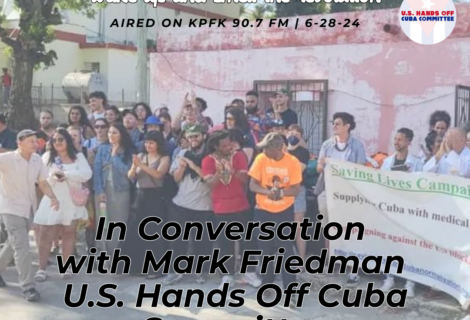“Selma” the Movie, Go See it, Become Informed, Decide for Yourself, Historically Accurate or Inaccurate?
On today’s show, host Eric Mann holds a conversation with Dr. Clayborne Carson , Director of Martin Luther King Research and Educational Institute at Stanford University, and curator of all the King papers. Director, Eric and Dr. Carson discuss the recently released move “Selma” and its relevance and place it today’s progressive struggle as attempts are made to deradicalize or bury the radical messages of Dr. Martin Luther King-though revisionist history.
Aired on January 06, 2014
Click here to download.
Commenting area
Leave a Reply
Leave a Reply
You must be logged in to post a comment.







Eric Mann gives us four reasons why Rev. Martin Luther King, Jr. should be understood as a central part of the Black radical tradition. Allow me to provide four reasons why his is one of the most important articles published in this season of over-written, under-studied MLK myth-making:
1. Like the wonderful photo of Minister Malcolm X and Dr. King together, Mann’s piece doesn’t dichotomize those two as opposites; he understands and explains the dialectic relationship which existed between them and exists in all great revolutionary movements. In addition to explaining some ways in which they connected, an area often neglected but neatly expanded in James Cones’ classic Malcolm and Martin and America (1992), Mann artfully sues King’s own words to explore the development of radicalism throughout the 1960s.
2. Our minds have been filled with images of “Martin Luther Dreaming King” and the 1963 Washington DC speech which is often excerpted beyond recognition to make King out to be some wide-eyed dreamer rather than a shrewd strategist. For all the faults that some have raised about the movie “Selma” (2014), at least that effort takes us to 1965 and shows that the movement was a bit more than just the work of one individual. Mann takes us a vital few steps beyond that – beyond King’s life itself – writing poignantly about his assassination and the threats he posed to the US establishment throughout his life.
3. Mann places King’s opposition to the Vietnam War in full anti-imperialist context, deepening our understanding of the significance of King’s 1968 position.
4. Mann writes of his own experiences as a young, rank-and-file student activist, influenced by King and others – but most significantly cognizant of the ways in which many of King’s actions were motivated by careful tactical considerations and not simply philosophical or theological callings.
Any serious 21st Century organizer should read Eric Mann’s concise article on Martin Luther King, and further our collective study of past revolutionary traditions as we build new traditions of our own.
I really enjoyed hearing your in-depth critical analyses. It is refreshing to hear someone really go 100% –– all the way –– not holding anything back. I really resonate with the idea that we aught to scrutinize even those things that we like, holding them to an even higher standard –– or perhaps not necessarily holding them to anything, so much as merely assessing the level of relative truth and merit they possess without using “kid gloves” just because we like the general orientation they seem to indicate. A caller made a point that you will rarely if ever get historical accuracy in films, yet I think his point is moot, because the space this show provides is precisely that sort of space in which we have a welcome indulgence in a rare example full-fledged employment of the critical faculties all human beings are endowed with, yet seldom seem to pursue to their full extent. I also deeply appreciated your comment about how directors and producers absorb the credit for what often begins as the genius of an oft-neglected screenwriter. I often marvel at this fact; it points to the fact that our society values superficial aspects of film (camera angles, visual presentation, “stylistic” concerns, etc) rather than what the film is trying to say. The best artists, though, recognize that style must always be subordinate to meaning, if art is to achieve its fullest potential. That is my perspective, at least. I’m glad to hear it reflected in the understanding of another besides myself.
Partially on your urging I saw the movie 1/11. I saw it the Rave Theater, in Baldwin Hills. The theater was 70% full with a 285 seat capacity, overwhelmingly Black.
About me: I am Black, active in Black and Marxist politics since 1970. I was 12 in 1965 and was interested in toys and games at that
age. That rapidly began to change for me in 1967 due to the Vietnam War and the exploding Black
movt.
On the movie: I have low expectations regarding Hollywood and telling/ retelling history. It all about entertainment, getting butts in the seats and making money
If a movie or any work of art prompts discussion and debate and especially action, good. We saw that a little bit last year with 12 Years A Slave.A long as the movie doesn’t lie and totally distort, e.g. Mississippi Burning. A truly despicable flick.
I agree with you that the message of Selma promotes liberalism, i.e. voting rather than mass action as a way to bring about change.That was clear in the King/Lewis discussion in the car near the film’s end and the very end of the movie before the credits rolled.
I believe King was a liberal while Malcolm was a revolutonary. Reform of capitalism thru integration vs. Its overthrow.
I may see the movie again, but only with friends
to discuss afterwards. I saw it alone on Sunday.
i think it would be good on the show to go more into the King/LBJ connection The film’s heavy concentration that threw me for a loop. But it
fits the liberal theme, I guess.
Overall, I give the film a 6 out of 10.
I see why you say it is dangerous. Unless one studies thehistory, it can easily sow illusions.